#go read your bible
Text

#christianity#christian blog#christian faith#christian living#christian girl#bible scripture#bible verse#old testament#psalm#go read your bible#hpmia
2K notes
·
View notes
Note
okay but like. I just had the weirdest thought about that ‘don’t look I’m naked’ comic. Which is that that’s essentially the same thing Adam and Eve did after they ate the fruit of knowledge of good&evil. So I feel like the theological implications of that could kneecap Gabe if he doesn’t think V1 is a being with free will.
yeah ok. i dunno man. is this anything
((side note. this isn’t necessarily meant to be in-character or story-accurate or take place at any particular point in time, just a way to explore some Thoughts. i was also imagining more that V1’s words aren't actually spoken, more like Gabriel’s more articulate interpretation of whatever garbled mechanical noise V1 is using to communicate. I think an angel could do that.))
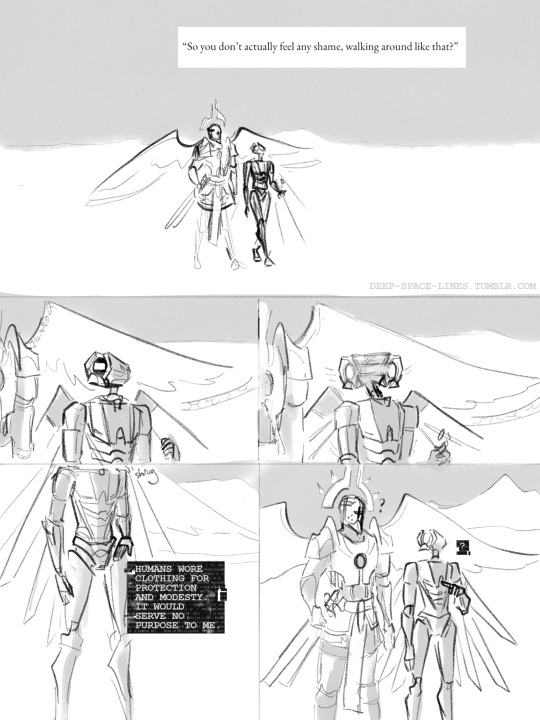

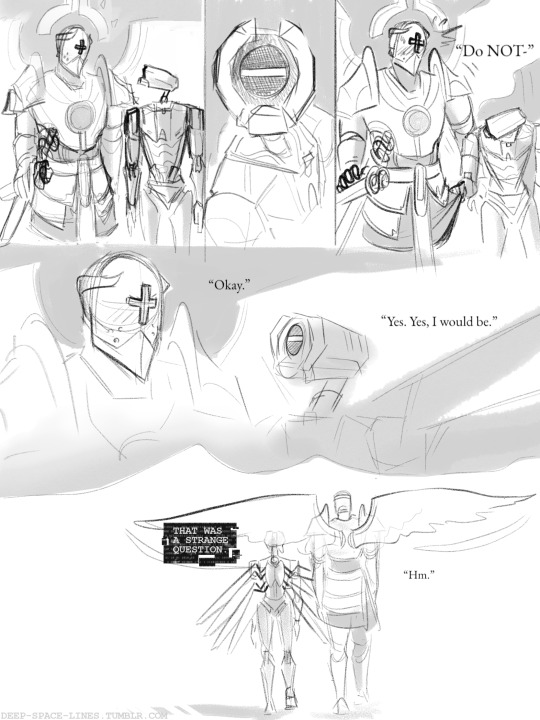
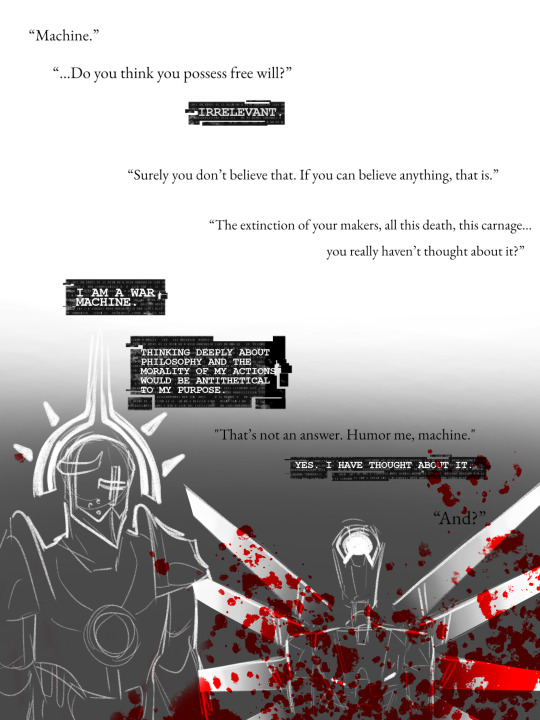
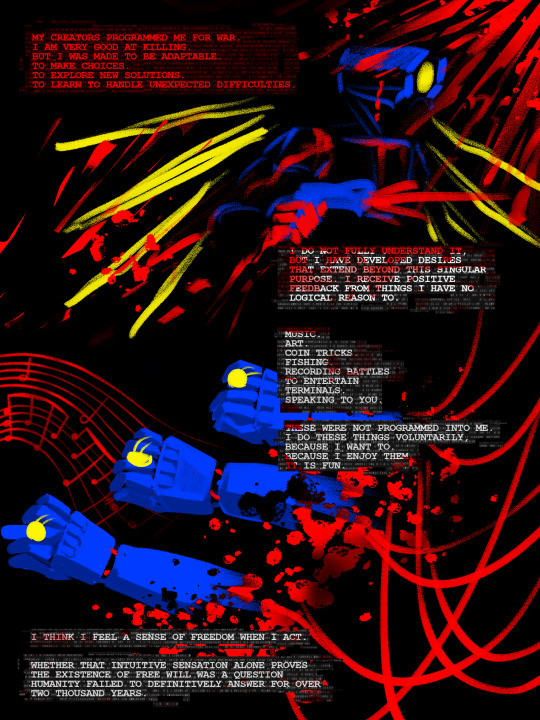
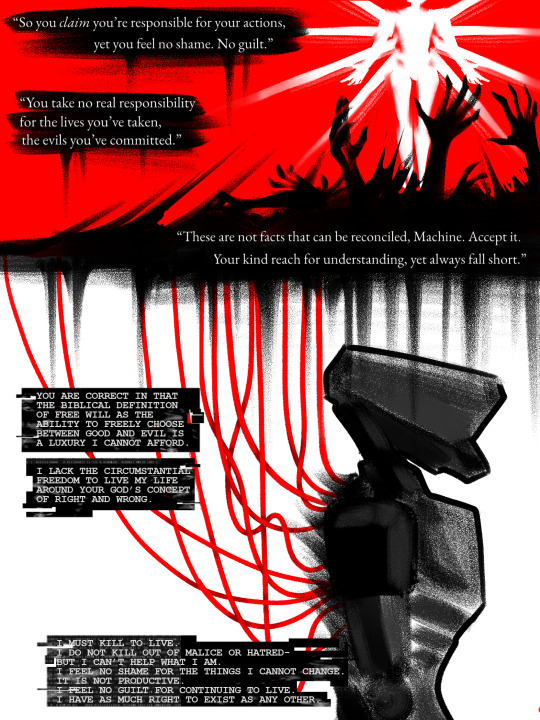
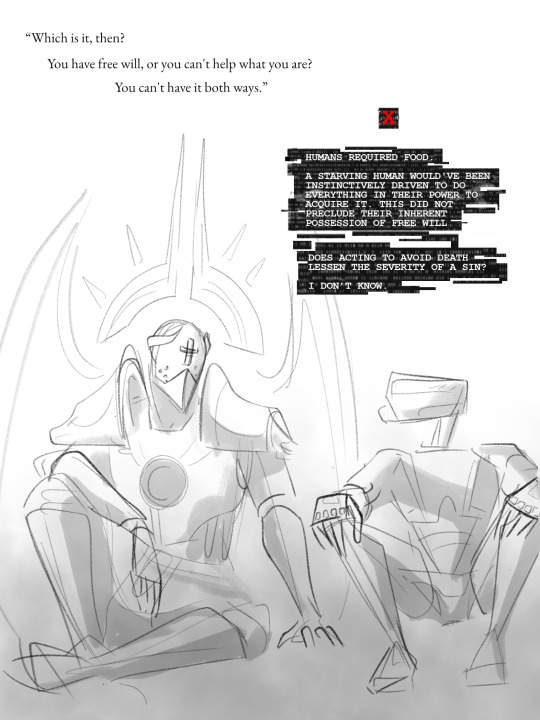
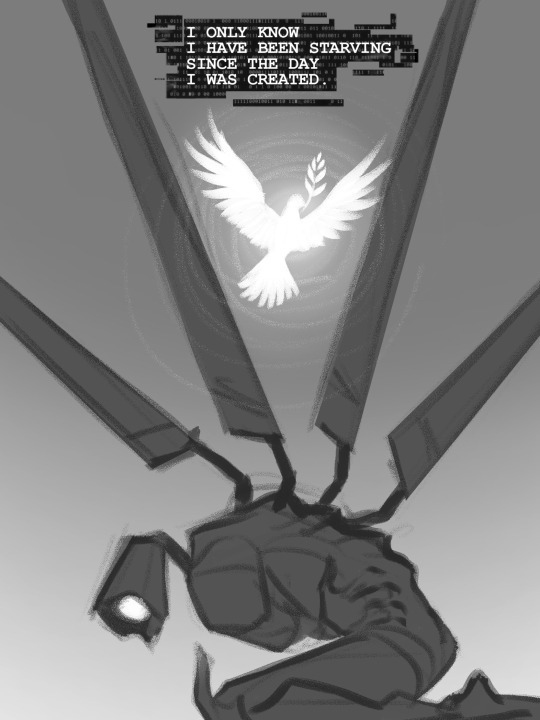

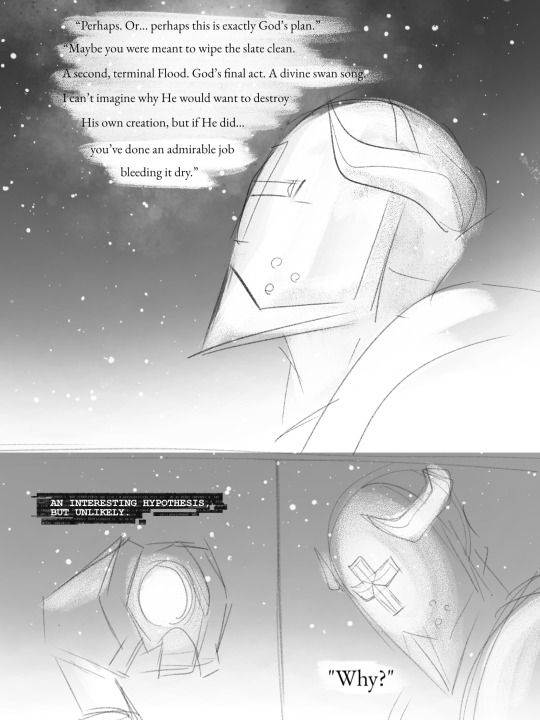

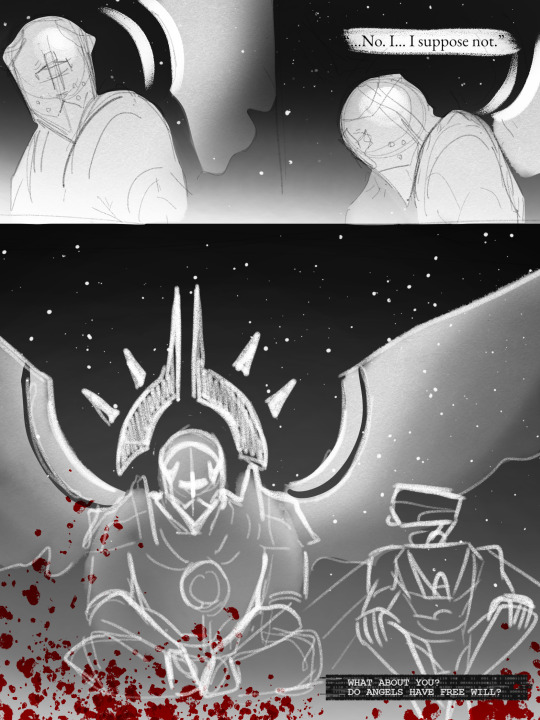
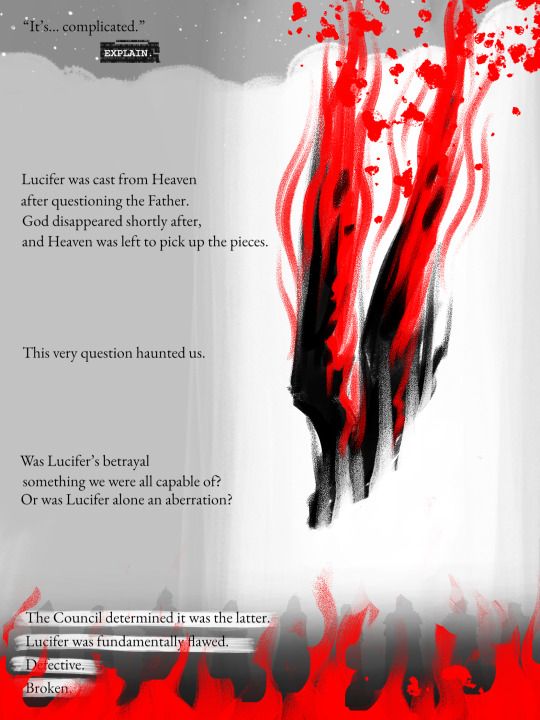
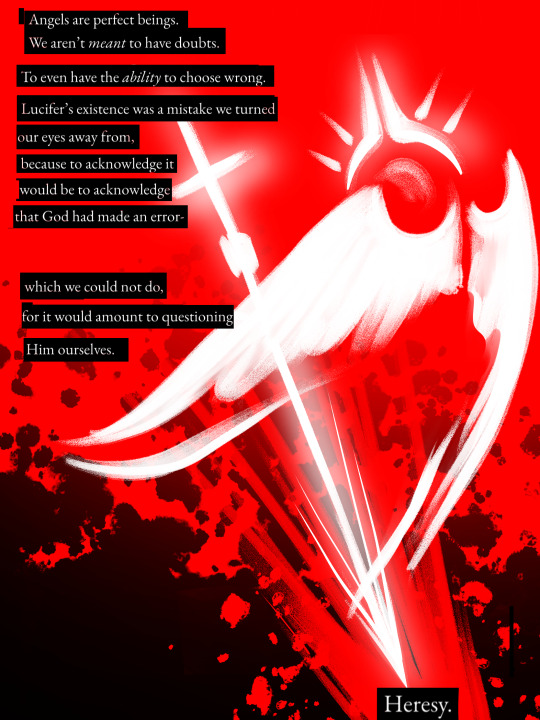
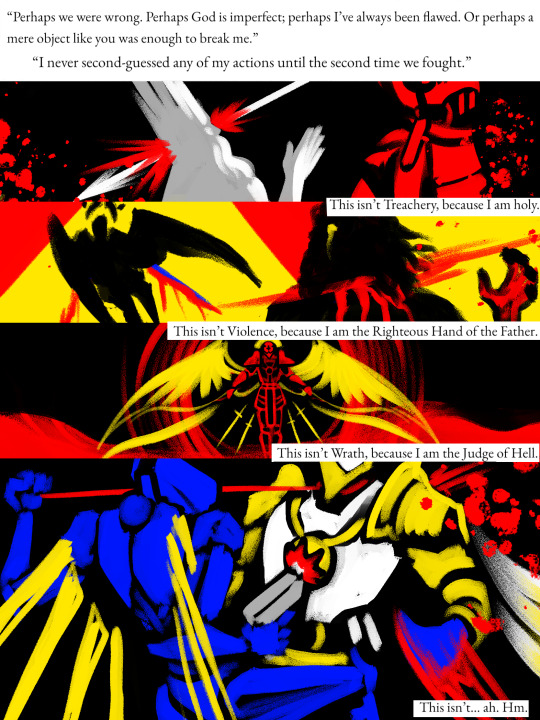
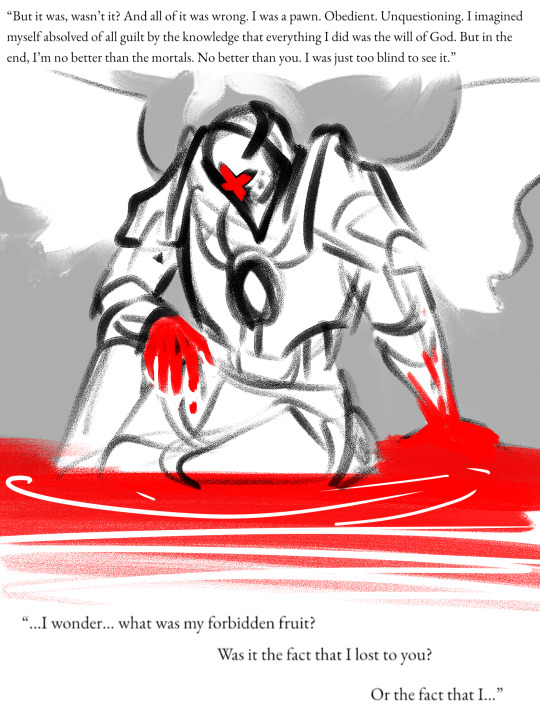
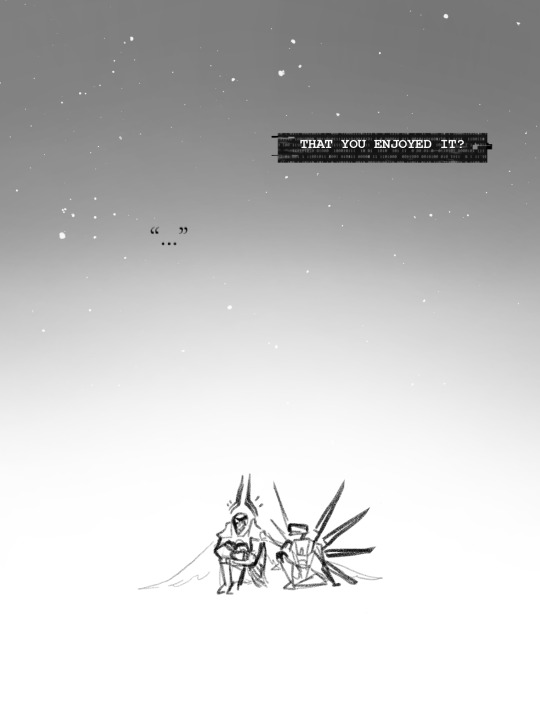
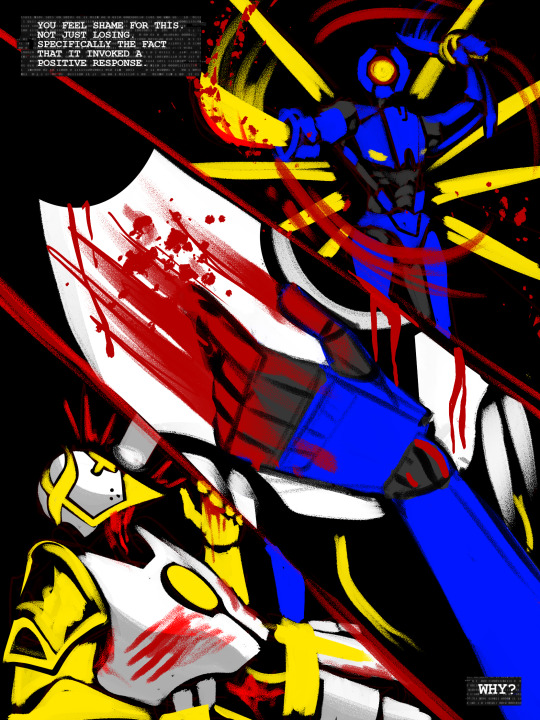

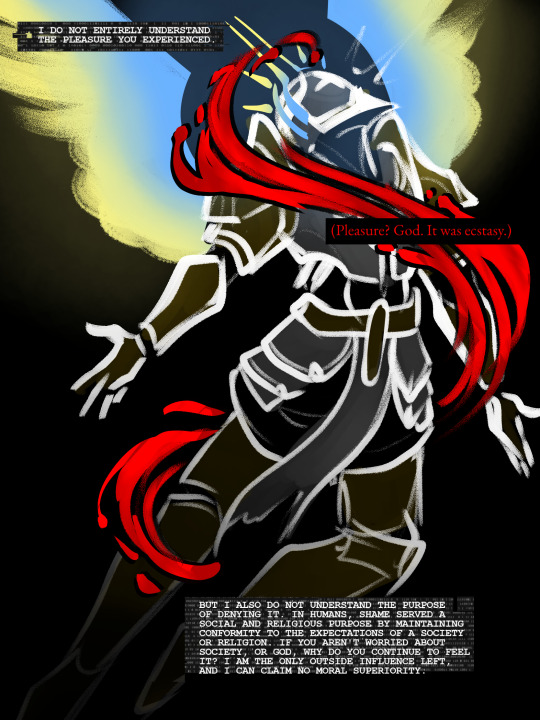
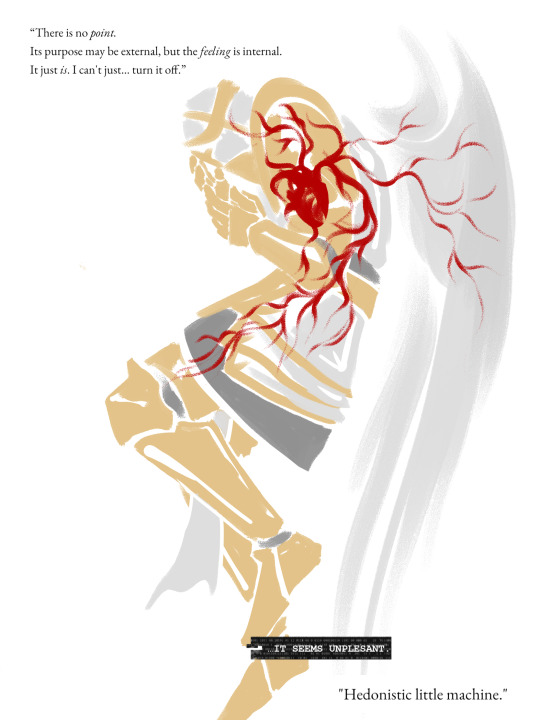

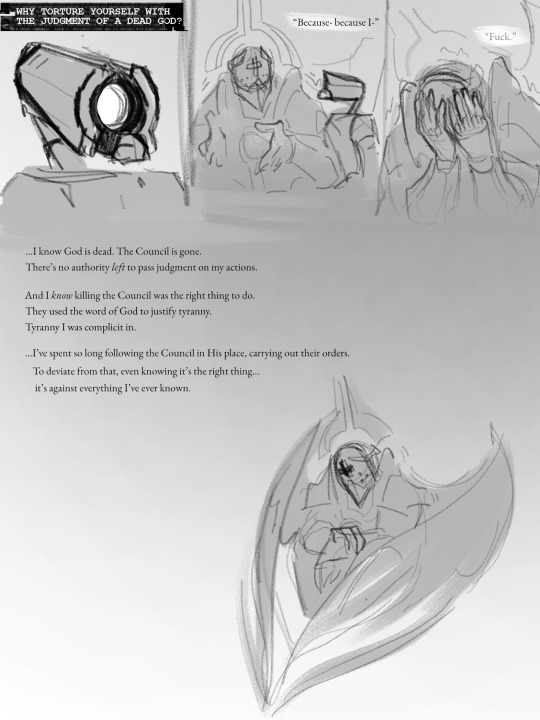


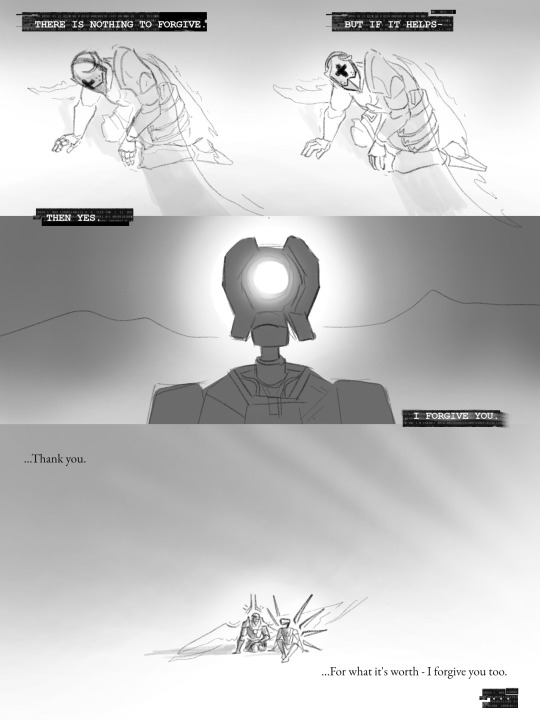


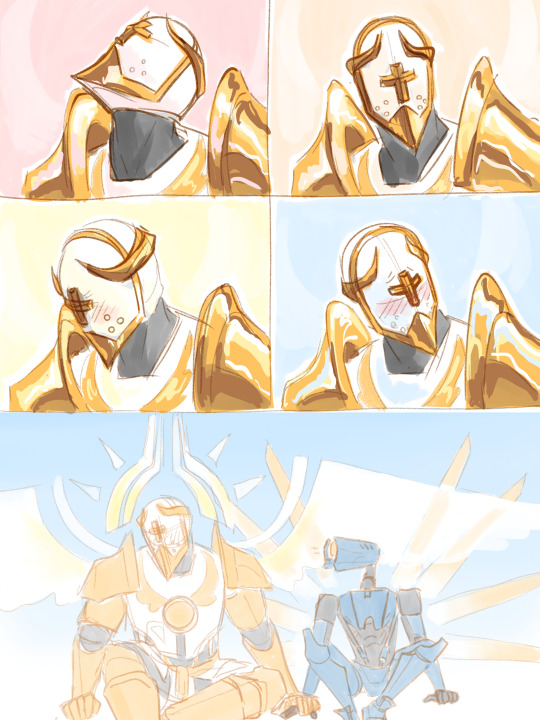

and then they fucked nasty the end
#my art#my writing#who fuckin sent this. fuck you. come off anon so i can kick your ass. (the thoughts this ask sparked consumed almost 3 days of my life)#i dont know what this even is#i just work here#disclaimer i don't come from a particularly religious background so like.#most of my knowledge of christianity comes from when my mom sent me to vbs for cheap babysitting in middle school or absorbed via osmosis#so i have no idea what im talking about except for when i do! hope this helps#i love how i say that like i expect biblical scholars to tear apart my ultrakill gay fanfiction#if you are a biblical scholar and you want to tear apart my ultrakill gay fanfiction please know i am not going to read the bible for this#ultrakill#v1 ultrakill#gabriel ultrakill#gabv1el#blood#love tagging ultrakill stuff with blood. hmm yes the floor here is made out of floor
1K notes
·
View notes
Note
as a 16th century clergyman what does machete think of the printing press
I think by the time he was born the printing press had been around for almost a century and a half, so I'd reckon the society as a whole was largely past it's initial novelty and controversy. Machete himself is bookish and nerdy, he's very invested in gathering knowledge about various topics and trying to piece together a good picture of how the world works. Getting access to reading material would be a lot harder if every book was still copied individually by hand. His standards are pretty high though, there's a lot of poorly translated, shoddily printed and flimsily bound books around and he's prone to scrunching his nose at them.
#his relationship with faith is kind of fraught and unhealthy#but as a top ranking cleric he's nonetheless fiercely protective of the church's interests that's his job#the reformation and the invention of the printing press enabled people to start spreading bootleg vernacular translations of the bible#suddenly folks had a chance to read the holy book in a language they could understand (if you were lucky enough to be literate at least)#this was a big deal remember it used to be only in latin and essentially gatekept by priests#not to mention you could now buy a copy of your own the cost of books had crashed they weren't necessarily rare luxury items anymore#you don't just go and cut out the middleman that's not how this is supposed to work#distressing times in the catholic church#answered#anonymous
199 notes
·
View notes
Text
I love AO3 because it is the only place on the internet where you do not need to worry about your works, or other people's works that you love, being deleted. You also know you can comfortably talk about anything you want. And I can properly tag it so that those likely to be triggered can block it.
For example, on Tumblr, if I wanted to discuss something dark, serious, or of a taboo topic, like say, eating disorders or anything sexual, I used to be able to tag it so that people triggered by those topics don't see it.
Now? If I talk about my experience with eating disorders and attempt to encourage others to recover, all with an educational and honest mindset, if I tag it with any of the common tags to get it seen by those people, I risk my entire blog being deactivated.
I have literally had this happen before. That is how my last blog died.
Now, if I want to make sure I don't see those topics, I can't block the tags because the people talking about them aren't tagging them properly. They don't want to be deactivated, so when they talk about them, it's with no tags or the wrong tags.
The amount of triggering pr0/*na stuff I've seen on my dash lately is ridiculous despite the fact my blocked tags look like this:

And so on.
Or think about an egregious example...wattpad. I don't want your shitty alpha mate erotic self insert bts fanfic. You know what I can do on AO3? Filter literally any of those terms out.
You know what I have to do on wattpad? Scroll past them all because they make up the majority of the top stories in some categories despite wattpad's terms of service. Sometimes, I will start reading a nice fantasy story only to get part way through the second chapter and MC is getting r*ped by a pack of "muscular, dominant werewolves." I would much rather the author mentioned there would be explicit heterosexual sex and rape. I would not read it then.
People also have boundaries in wildly different places. I'm okay with reading a story about lesbians involving consensual nonconsent, you know, bdsm style, where the rules have been worked out in advance and there's a safeword + signal. That's fine, it doesn't bother me at all even if I'm not particularly interested in it. But make it a man r*ping someone physically weaker (regardless of gender) nope! I'm out. Even if it's not for pleasure purposes and is a dark scene which is traumatic for the character and is important for whatever psychological themes of the work. Aspects like that can be included in writing legitimately, especially in works on the more psychological side. But I do not want to see those particular topics, so I filter them out. No problem.
My favorite fic author of all time writes a ton of disturbing stuff in the death note fandom, which, given the tone of canon, is a ripe canvas to work from. Half of the good psychological death note fics would be banned within the first couple of months, I'm sure. Even darker/more intense works like psycho-pass? It had a r*pe scene in the very first episode. It was definitely not meant to be gratifying to the viewer. It is meant to be horrifying. Any fics that deal with any of the topics canon deals with? Control, manipulation, gore and physical violences spanning the range which occurs in the real world and how you deal with them? How you deal with the people who commit them? There is a vast amount of ugliness canon portrays that is meant to make the viewer uncomfortable. If it makes you uncomfortable, good, you are a normal person. If you're not up for these topics, filter them out.
Those of us who want to see even the ugly sides of human experience discussed in writing can read them in deeply unsettled peace and you can read a different fic.
Banning these topics from being discussed entirely? You make the whole of literature, of what we are allowed to discuss publicly, more shallow. The depths are banned. You can't discuss anything about them. Not from the cathartic voice of an abuse survivor or the philosophical curiosity of someone who wishes to understand people, even bad people.
In short, it's dumb, and completely missing the point of an ARCHIVE.
#AO3#censorship#not even going to get into the whole purpose of it being an archive thing but#you don't just delete shit from an ARCHIVE because you don't like it#it is meant to preserve everything#that's like banning fascist books from libraries even if academics are reading them to understand the cultural mindsets which led to fascis#ran out of characters#anyways you get what i'm saying#the bible has whores and violence#somehow that is okay for children to read#yet fics on ao3 that are decidely not for children cannot even EXIST#like bestie your 7 year old is not looking up smut fics chill out
692 notes
·
View notes
Text
The problem with the church today is that so many "Christians" do not actually believe in redemption.
#unironically christian#i say this because of all the people who make comments about people's testimony#like saying they don't believe that only fans girl who was saved and baptized was really saved#like... reading through the comments it becomes clear that the “Christians” don't actually accept her#like... my brother in Christ... your good deeds are as worthy as my used pad#that is straight up in the bible#you are not better than her and you do not deserve redemption more than her#her salvation is between her and God#and yes... you say that time will reveal her fruit and you are correct#but guess what#ananias was called to extend a hand to paul *before* his fruit showed#and he was a frigging serial killer who was out for ananias's blood the week before#you do not get to pick and choose which converts you get to except#you are not God and thank heavens for it because if you were we would all be doomed#*deep breath*#i am just so sick of this... farse... that Christianity has become#Christians need a wake up call#oh! and and when you act like its impossible to accept that she could be saved you belittle God's power#you call into question Jesus's blood and it's ability to cleanse and if that is false your salvation is worthless!#also also you go against the things clearly written in the Bible while wearing the title of Christian#which means you are misrepresenting God's nature and intentions which means you are breaking the command to not take the lord's name in vain#wow... i thought i was done at the deep breath... guess not😅#rat rants
23 notes
·
View notes
Text
#fallout new vegas#fallout#courier six#fallout 4#fallout 3#lone wanderer#sole survivor#fallout 2#fallout 1#chosen one#vault dweller#fallout poll#polls#polls no one asked for#I love reading your tags <3#okay let’s go#my LW is names Laurel Alda Catherine Moran#Laurel from the bible where a crown of Laurel is given to those who persevere#Alda means ripple - referencing project purity and the effect Laurel’s actions have on the wasteland#and Catherine for her mammy :)#my courier crutches at his beard while thinking he scratches his forehead with his thumbnail and his fingers twitch when he’s angry#my LW rubs her nose while stressed to it’s rubbed raw after she left the vaults#my vault dweller picks at her sleeves when she’s anxious#she does this to stop picking at her fingers and hurting them#the chosen one and her kids -including the courier have no idea that the Lw exists or is their cousin#my sole survivor has no idea that her brother survived the nukes and his dependents are alive#and that the vault dweller maccready is talking about is her great g g g g grand niece#Wesson’s speech is slurred from nerve damage and he sometimes speaks slowly and takes long pauses#he gets dizzy sometimes and has to lean against doors or the backs of chairs#ooooop going to have to pt 2 the tags that’s never happened
137 notes
·
View notes
Text
Reading Nehemiah 8 (9-10), shocked and spiritually renewed in the club tonight!!!!
""Today is holy to the LORD your God. Do not be sad, and do not weep"—for all the people were weeping as they heard the words of the law. He said further: "Go, eat rich foods and drink sweet drinks, and allot portions to those who had nothing prepared; for today is holy to our LORD. Do not be saddened this day, for rejoicing in the LORD must be your strength!""
OR "“Go your way... and do not be grieved, for the joy of the Lord is your strength.”" depending on the translation. OKAY
#OKAY SO#THE JOY OF THE LORD IS / MUST BE YOUR STRENGTH#OKAY OKAY OKAY I'M FEELING SOME KIND OF WAY ABOUT THAT#faith tag#they were reading the recovered book of the law out loud to the people btw#and the people responded by weeping (REASONABLE)#(THAT'S HOW I FEEL A LOT OF THE TIME WHEN DOING BIBLE STUDY ESPECIALLY AFTER NEGLECTING IT)#but the leaders of the people told them go and REJOICE!! and eat rich food and share and REJOICE!!!#OHHHHHHHHHH
51 notes
·
View notes
Text
On today's episode of Holy Shit My Childhood Was Not Normal:
Kurtis Conner being thrown off by the girls'/boys' bibles with the random "Dream Girl" and "Grossology" passages and shit like that in them
#I didn't have that exact one but I had a girls' bible with the lil dream girl passages in them#mine was purple and green#There was a specific one I read over and over because it was about thinking about your best friend#and I thought about my best friend that way#except it wasn't actually in a friend way I flat out just had a crush on them lol#I later went on to id as a lesbian and that specific story made helped me realize it#so maybe that bible was good for something#I'm now a lil bi boy who might be ace but still#Im 21 now actually Im a Man in the U.S. /j#it's just#always so funny watching people remind me that I grew up Not Normally#like I genuinely got so into reading those lil bible dream girl passages#but I also preferred the gross out shit of the boys' one#cause I was one of those cartoon network poop fart joke funny tweenagers#I loved gaming stunts and all things gross or whatever#I wasn't allowed to actually do that because I was a lil lady so I enjoy it now#I tell people I'm going to shit their pants if they don't leave me alone and think I'm the funniest human alive#anyways go watch kurtis's new video about gendered products it's good#ex christian#religious trauma
94 notes
·
View notes
Text
you know a fic's influence is so strong when you see something from the media it's from and immediately think back to it
#you've got the right to remain right here with me by unseeliekey on Ao3#whatever tumblr user bamsara has written I haven't even read most of them#'The terrible consequences of being paired with your crush for a partner project' by chivalrousamour on ao3 is like the yttd bible to me#and Sara Chidouin beats Sue Miley to death for being a clown on Ao3 is the prayer#anon go to sleep
7 notes
·
View notes
Text
Her True Name
A Retelling of "That Dear Name," a Russian folk tale. Written for the @inklings-challenge Four Loves Fairytale event.
Note: I’m retelling this story based on the version by Pavel Bazhov in his beautiful book The Malachite Casket, which I happened to pick up at a used bookstore a few years ago. Unfortunately, I can’t find that or any other version anywhere online (it’s apparently way more obscure than I realized??), but the Wikipedia page for the original tale is here.
-
This is a fairy-tale, but it did not happen once upon a time. This fairy-tale happened in 1586.
It happened four years after Yermak Timofeyevich and his five-hundred-forty Cossacks rode against Kuchum Khan and the Six Tatar Princes in 1582 and turned their bones to water on the banks of the Irtysh River.
It happened two years after Yermak drowned in a different river, pulled down by the silver shirt of chain-mail that Tsar Ivan had given him as a gift. The Tatar Princes divided his armor up, it is said, but his body they buried with due honor. That was in 1584.
Two years after the Cossacks were left without their great leader, this fairy-tale happened. It began in Siberia in 1586. It is still happening today.
In those days, in a high and lonesome place in the Ural Mountains, there was a village whose streets were paved with gold. To the heroine of this tale, whom we will call Lidik, this never seemed extraordinary in the slightest
Lidik’s people were neither Russian nor Tatar nor Vogul nor Ostyak nor any other group that you may have heard of; they were an Old People who had lived in isolation for a thousand years, so that they neither knew nor cared about the world beyond their village.
Yet this land on which this Old People lived was the kind of place in which people often find gold. Flecks of gold were scattered through the sand of the streets. Larger nuggets laid about like ordinary stones: the men hunted with lumps of gold in their slingshots and the women pounded the washing against gold-veined rocks by the river. Children played with golden baubles and no one thought anything of it. Try to imagine what Lidik’s world was like: to her, gold seemed as common as steel is to you and me.
High in the Urals, these people lived and worked not in wooden buildings but in caves that their ancestors must have dug out of the rock. The largest of these was beneath Azov Hill: so large it was that even when lit with a hundred torches, a man standing at the entrance could not see full to the back. In the old days, the village would gather there for meetings and dances, weddings and funerals.
Now, the cave beneath Azov Hill is full of secret things. These secrets, and Lidik’s role in them, are the subject of this fairy-tale.
Lidik was the second child and the first daughter of the chief elder. Brave she was, and resolute; yet she was also kind and vivacious. She sang like a bird, and she laughed and wept with equal vigor. In the year in which our story takes place, Lidik played with the village children and sang round the cookfire with the other women. At festivals, she was the first to leap to her feet for a dance, and then all the young men of the village would line up to be her partner, and the old women would shake their heads and say, “Ah, to be young again.”
The Old People loved Lidik very much.
In those days, the world was growing smaller and people began coming to this remote village in the Urals from distant lands. First, the Tatars rode by on new trade routes, but they took little note of the village and did not linger. No, it was not until the Cossacks came that the trouble really began. Without knowing it, Lidik’s village had been annexed by Russia and now the Cossacks had come to tell them.
These Cossacks were not evil men; I want that understood. There are no evil sorcerers or black knights in this fairy-tale. No, these were men who had once lived free in a land of their own, the same as our villagers. Yet they had sold themselves into the service of the Tsar and were under his orders to tame the Siberian wastes. Once Yermak Timofeyevich was drowned in his silver shirt, his soldiers did as they liked for themselves.
As I have said, the Old People hunted with slingshots, but the Cossacks had muskets. When a scout returned to camp with reports of a village whose streets were paved with gold, greed bloomed in the Cossacks’ hearts and at once they decided that they would ride against the Old People, put them to death, and carry away all their gold.
Yet the Cossacks were not all of like mind. As plans were being drawn up for the attack on the village, one man – a lad called Stepan Vasilyevich —heard what they were planning and his heart recoiled against it. Stepan hated what had become of the Cossacks in Siberia since Yermack’s death (in the river, weighed down by the Tsar’s gift). What's more, Stepan Vasileyevich loved the Old People, though he had never met them. Thus, he made up his mind to go to his commanders in protest, though he feared they would not heed him.
“Have you no shame?” Stepan asked with a heavy heart. “Before, we attacked other soldiers who had weapons and fortifications. Then, we stripped merchants of their wares unprovoked. Now you mean to rob these folks of their last and put them to death for it? I say again, we are soldiers, not bandits. These people have not harmed us and may not even know of us; let us leave them in peace.”
Yet Stepan’s fears proved true: the other men heeded him not. Instead, one of them stabbed him in the belly with his saber and they left him in the forest to die.
But the wound they gave him was a seeping wound, not a bleeding wound, and so Stepan did not die quickly. Instead, he staggered deeper into the wood in the hope of reaching the village of the gold streets. He knew the way the Cossacks meant to take and he followed it. “For,” he reasoned, “if I can find these people before I die, perhaps I can warn them of the attack.”
Here, at last, the maid Lidik enters our tale.
She was fond of walking the tree line as evening fell, you see. Even in winter when all was dark, she would stroll along the place where forest met stone after supper, singing softly to herself and nodding to any friend she happened to pass. One night, she was doing just this when she heard a noise in the distance. It was like the cry of a man’s voice, and in Lidik’s heart it stirred curiosity and compassion in equal measure. She ventured into the forest to find the source of the sound.
There, tangled in the underbrush, she saw the form of a strange man (who we know to be Stepan) lying where he had fallen when he at last could go no further. He was half-conscious and bloodied, but he cried out again and again though his eyes were closed. He was dressed in clothing that seemed to come out of another world and he bore weapons that Lidik did not recognize. Instinctively, she drew back in fright.
But Lidik was brave and her compassion won out. Moments later, she bent and inspected the man till she found his wound. She bound it with cloth from her garment, carried him to her father’s cave, and there began to tend him.
All the while, the strange man went on crying out, but because she could not speak his language, Lidik did not know what he was saying. She thought his words must be exclamations of pain.
In fact, Stepan was warning her of the coming attack with his every breath. Yet after a time, his breaths ran out and he lapsed into sleep.
When he woke, Stepan found himself surrounded by strange people, and the woman who had found him the evening before was among them. A man – who seemed to be the woman’s father– spoke an unfamiliar language, and Stepan could not understand him.
Yet as it happened, Stepan knew Tatar and some of the Old People, who remembered when the traders had ridden past, knew a small bit as well. Thus, in snatches of Tatar and with gestures to fill in the gaps, Stepan issued his warning.
The chief elder thought for a long time before replying. “The mountains – too treacherous – winter,” he said. “Men survive—children perish. We remain.”
“My people do not know I am here. You attack from your caves when they come–turn them back for a while,” Stepan managed to say. “Soon it will grow colder.”
As her father and brother went to confer with the elders, Lidik remained by the strange man’s side as though bound to him. For three days, she sat at his bedside and fed him meat, honey, and vegetables. As she tended to his wound, she often sang softly in her own tongue. In broken Tatar, she whispered “thank you” again and again. “Thank you. Thank you for coming here. Thank you.” Lidik loved her people very much, you see.
Meanwhile, the Old People set a rotating lookout atop Azov Hill. Day and night, they watched the woods with vigilance, prepared to light a beacon fire if any disturbance came from the forest.
As they spent their days together, Lidik and her stranger slowly began to speak. Their talk was some Russian, some Tatar, some the tongue of the Old People, a little Balachka, and much laughter. They bandied words back and forth in four languages and made up the deficit with gestures and looks and more than a little patience.
"I come from a place by the sea— a great body of water, yes?” Stepan said Russian. “A long journey south and west of here. My people are called Cossacks. Free men.” He gestured to himself, then west towards the setting sun.
Lidik repeated his words in Russian. "You are Stepan. You come from the sea. You are Cossack. From south and west.” Then, in the Old Tongue, she added, "It must be very far south, I think. You look like a man who sees a great deal of sun."
In the Old Tongue, Stepan replied, "Home is many weeks away by horse. It is very beautiful."
Then, because she still had not told him, he asked, “What is your name, lady?”
After a long pause, she replied in the Old Tongue. “You may call me Lidik, though it is not my name.”
Puzzled, Stepan repeated the question in Tatar. “Do you know what I mean, ‘name’?”
“It is how you are truly known, yes? Lidik is what I am called, but it is not my name.”
Are you surprised, Dear Reader?
Among the Old People, names were sacred things. Only Lidik’s father and mother knew her true name. When she married, she would give it to her husband: she would whisper it in his ear after their hands were fastened, or perhaps later she would gasp it to him when they came together. All of this, she explained to Stepan with no small amount of stammering and blushing.
“Only those who gave me life and the one to whom I am joined in the flesh can ever know me truly,” she concluded. “Is it not so with you?”
“No,” said Stepan. "My people shorten the names of those we love. My family called me Stiva. Yet for us, names are not a matter for blushing."
This only made Lidik blush all the more fiercely. "You are a stranger. Ordinarily, I would not need to explain such things."
The attack came at dawn on the fifth day, but the Old People were ready; they ambushed the Cossacks from their caves as the soldiers emerged from the wood. Since it was a dense wood, the Cossacks were not mounted, and the caves proved to be good fortresses. Thus, the Old People managed to turn the Cossacks away with nuggets of gold from their slingshots. Yet they knew that this was only a temporary reprieve.
When the Old People returned victorious from their battle with the Cossacks, they came again to confer with Stepan. Then, with Lidik’s aid, he told them why the Cossacks had come and why they would return.
“All the gold you have—the yellow metal, yellow stone–that is the cause of all this,” said Stepan in Russian, pointing to a gold trinket that sat nearby on his bedside table.
“What of it?” asked Lidik, with an exaggerated shrug for emphasis.
“My people come for it. They will kill you to possess it. They will never let you be.”
Lidik conferred with her father in brief, then mimed giving something to Stepan. “They can have it.”
“No. You must hide it from them. When the winter ends, word will have reached the Tsar that there is gold here and then you will have no life worth living.”
The elders again conferred. “What would you have us do?” Lidik asked in Russian.
“You must take these stones, all these yellow ones, yes and every golden trinket and bauble that you have, and put them out of sight. Cover the flecks in the sand with earth. Then depart for another place. Perhaps, if you do this, your children may someday return to live here.”
And Lidik told her father all that Stepan had said.
So it was that the Old People spent the rest of the winter moving all the gold they could into the cave beneath Azov Hill so that it was all out of sight. They covered their golden streets with black earth from which grass might grow. Then, they made preparations to abandon the village for another place when spring arrived.
All this time, Lidik continued to care for Stepan, but she was not alone in doing so. One of the guards often took it upon himself to carry Stepan to Azov Hill where he could sit with the lookout in the fresh air. "Good for the blood," he would say in faltering Tatar.
A neighbor woman made Stepan a gift of her thickest bearskin blanket. "My son is lame," she told him. "He cannot run. If we had been attacked without warning, my dear boy surely would have died."
The village’s healer looked in every day. She brought herbs and salves and even rich foods from her own larder. Yet for all her ministrations, Stepan’s wound continued to seep.
When at last, the day came for the Old People to leave their village (whose streets were no longer paved with gold), Lidik’s father issued instructions for Stepan to be counted a member of his own household. Stepan only shook his head.
“Death is close to me,” he said in Russian, looking to Lidik to translate. “I will not survive the journey. You must leave me here.”
Lidik turned back to her father. “He says that he is dying and will not leave this place.”
"But for you we may all have died. I will not allow you to be left behind alone. As chief elder, I forbid it."
Yet when she heard this, Lidik did not speak again for a long moment. She knew that Stepan spoke true when he said that he would not survive the journey; she had changed his bandages for more than three months and knew that he had healed very little.
Yet equally, Lidik knew that her father spoke true when he said the Old People would not abandon Stepan to die alone. They loved him too well, and for that they would joyfully waste precious time and resources on a man they could not save. This, she must not allow them to do.
“He will not be alone," Lidik said in the Old Tongue. In Tatar: "I will stay with him." Then finally, she turned back to Stepan and in Balachka, she repeated, "I will stay."
Didn't I tell you that Lidik loved her people? Didn't I say she was brave?
"What do you mean?" demanded her brother. "This man is not your husband. What is he to you that you should leave your people to be with him?"
"He is the man who staggered injured through the forest for love of our people, though he knew us not. I will not forsake him,” Lidik answered.
So it was that when the Old People left their village behind, neither the Cossack Stepan Vasilyevich nor the maid called Lidik was among them.
“Well then,” Stepan finally said once all the Old People were gone. “I still say you ought to have left with your kin—but all the same, I am grateful not to be alone.” Then, in Tatar, he whispered, “thank you.”
Together, Lidik and the dying man retreated into the cave beneath Azov Hill and she laid him among the piles of gold. They were terrible to behold: golden stones and nuggets and all manner of trinkets heaped like coal all throughout the enormous cavern. When the early spring light pierced the darkness, they shone like a thousand little suns.
They waited. Stepan slept a great deal, and when he woke Lidik gave him meals of dried meats and honey. She sang softly, both to comfort her companion and to occupy her own mind. But when at last she heard the sound of horses in the distance, Lidik got up and sealed the door.
Then, as the darkness settled over them, Stepan knew that his hour had come; but he wished to leave Lidik some hope. He did not have the words in any language she would understand to express what he really meant, so this is what he told her:
“Hear me, Lidik. A day will come in this land when there are no more Tsars or soldiers and even their names shall be forgotten. People will come here from all over and they shall not kill or steal, and one of them will call out your name—your true name—from beyond the cavern door. On that day—not before and not after, you understand?—you must go out to him with a brave, merry heart and take him as your husband. And when that day comes, let any man who wishes it take the gold, if they have use for it.”
In the Old Tongue, Lidik answered: “How will this man know my name if I have not given it to him?”
“You and I have loved each other a little, have we not? I warned you of the attack, though it costs me my life; you have stayed with me, though it costs you yours. Yet the man who is your true husband has loved us a hundred times more. He knows your name and mine, dear one. I promise.”
"Then I will do as you ask."
"Good," he said in Balachka. "I pray the wait will not be too long."
With those words, Stepan fell asleep, there in the cave beneath Azov Hill surrounded by piles of gold.
His body cooled, and yet it did not decay. And what’s more, by some magic the woman called Lidik did not die or even age as the years wore on. She remained forever young and vivacious, alive in her cavern of treasure with Stepan's body beside her.
See? I told you this was a fairy-tale.
From that time, no one could enter the cavern beneath Azov Hill, though they tried in every way. Gold is a powerful incentive. Soldiers came with cannons, but the door did not yield to them. They bore into it with shafts and hammers. They tried dynamite and buried charges of black powder. In the ‘60s they fired at it with missiles, but even that was no good. The door holds; no one can gain entrance by force.
Yet there is an even greater hope for laying hold of all that gold, piled like coal in the keeping of a maid who does not age.
Over the centuries, crowds of people have come to stand by Azov Hill. They shout all manner of words. “Azovka!” some cry, “Lapochka!” Others call out every female name they can think of, "Natasha!" "Anna!" “Soo Lin!” "Jenny!" Still others shout gibberish until they lose their minds with it; until they forget what words are and babble only nonsense till they die. Each man hopes to happen upon the lady Lidik’s true name so that she will open the door to him. To this day, none have ever succeeded.
Yet I can assure you that the lady called Lidik lives still. You can hear her singing if ever you come to Azov Hill. When the serfs were freed, some said she sang for joy, and likewise some claim that her songs turned melancholy when the Iron Curtain descended. Others will tell you that her song never changes: grief and hope are blended in her songs, and so it has always been.
That was how it seemed to me on the day I stood before Azov Hill and listened to the sweet voice that seemed to come from the very heart of the mountain itself. I did not try to guess Lidik’s true name; there is only one who can know it. Instead, I simply called to her in my own language. I told her this: “I’m waiting too.”
#as soon as i saw the theme for this challenge i knew i was going to retell this story#it is the most overtly Jesus-y fairytale I've ever read it's unreal#'someday when they world is made right your husband will come and speak your name and then you must go to him'#that's like#that's just the Bible guys#this was like the next-to-last story in the book and it totally shook me to a stop when i finished it#sorry the original is apparently so inaccessible ☹️#this is what happens when you pick up random books at used bookstores#fairy tale: that dear name#theme: agape#story: complete#inklingschallenge#leah stories#pontifications and creations#posting now because darn. what a day. it's time#inklings challenge
60 notes
·
View notes
Text
funny how when I need emotional support, I can’t have it. I miss you @kaleb-is-definitely-sane
#my lovable idiot <3#kabob <3#OF COURSE HE THINKS I LIKE MY FUCKING GUY BSF#YOU CANT LEAVE ME LIKE THAT#IDC IF YOURE GOING TO READ YOUR BIBLE AND GO TO BED#YOU CANT LEAVE ME HERE CRYING CAUSE IM AFRAID THAT I HURT YOUR FEELINGS
13 notes
·
View notes
Text

Ezekiel 36:26
#christian blog#christian faith#christianity#christian living#christian girl#bible scripture#bible verse#old testament#ezekiel 36:26#go read your bible#hpmia
239 notes
·
View notes
Text
vent post in tags
#have i developed a fear of going to bed?#i do not fear sleep#i just fear the agony of insomnia because that means more time for intrusive thoughts and loneliness#and i want to call my friends and be like 'long distance sleepover lol'#but at the same time#i know i can't ALWAYS do that or expect that from others#but i just.... don't want to spend nights alone anymore#I do read my Bible and practice devotionals and I do have good nights but sometimes it's just.... there are times when things get bad#anyway if any mutuals know how to counteract insomnia without drugs i would really appreciate the advice#part of me is also just begging God to bring me someone who will stay up all night with me#even just once#i don't even really pay attention to the plotline of Big Bang Theory but when mom turned it off tonight and said 'I'm gonna go to bed'#and left me alone in the living room i had to fight the urge to cry#it's just#i needed to say this#i don't expect anyone to message me but please at least keep me in your prayers because this has been going on for months and I don't want#to be silent about it anymore
8 notes
·
View notes
Note
HI. I loved your marchil fics and I love your lil blurbs and hcs and all you're lil thoughts on them it's beautiful and makes my heart melt. It's just seeing this lil guy and how he has all his feelings locked away in a box until marcille walks over and picks right through the lock and gets him to open up (well in a metaphorical sense-).
DAMN YOU FOR GETTING ME DEEPLY INVESTED IN THESE IDIOTS I LOVE THEM SO MUCH IM GETTING CUTE AGGRESSION!!!!
I KNOWW RIGHT, I love how you described it!! There’s so much fun imagery and metaphors you can do with them… They lost focus and had a consensual workplace relationship, as people say

I love their dynamic they are so romcom shaped… Speaking of romcoms I recently read Dame na watashi ni koishite kudasai/Please love me ! which has major marchil energy, I love reading it while thinking of them lmao. They banter and she infiltrates his social sphere & gets all the family gossip and also he owns a cafe and cooks her things, it’s like my coffeeshop AU but real 😭💗

People when getting into marchil:
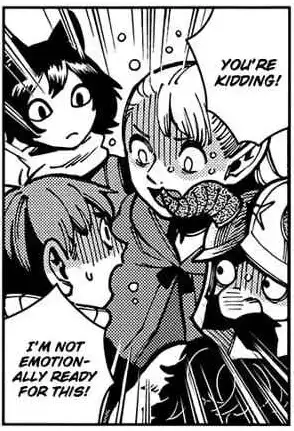
Thank you for this ask! 🥺 It’s always really nice to hear things like these… I never know what to respond though so naturally I shall go overboard, handing out more marchil thoughts as per popular demand! Marchil nation is a tiny island I’m sorry for getting you invested, but also mwahahaha hahahA YES HAHAHA YESSS! Handing you these ramblings as apology
My motivation to write essays has been waning lately BUT I do have a big post about theories and facts on Chilchuck’s family planned, his wife and daughters plus some Chil’s dad and siblings, the whole package. On top of more marchil crumbs to post oof… Ideally I should also rework the first part of the marchil crumbs to make it more streamlined and dare I say convincing. Also fanart and fics which I hope to get around to finishing up… I def want to make more marchil content, but I honestly have no clue which idea to work on next… (I take requests and prompts btw~). I want to make more fluff but I also want to make more hurt/comfort, ahh dilemma
One idea I have that’s particularly relevant is a fic that I’d call Locks of Hair, about blonde hair and the key to his heart.
I’d love touching on his attraction to blondes and how that might affect their relationship in a neat lil introspective oneshot like I like to make. LOCKS of hair? Being the KEY to his heart? I love the english language. There’s sorta this trope where if a character loves money has a liking for blondes it’s because like, the hair is "golden", and I’d find playing with that so funny too.
Another that really has my heart right now is Marcille’s mom visiting them to see her daughter and meet her new partner Chilchuck, and it throws them into a frenzy to prepare for it, Chil being entirely too stressed and dreading. And seeing them her mom’s eyes soften and she tells them they remind her of her and her late husband… The bittersweet pride mixed with anticipation at how her daughter has grown into someone who can accept loss, and is willing to throw all of herself into loving despite them not even having 20 years together ahead of them…….
I think about marchil proposals and marriage a lot. Hey hey did you know that in Japan "I want to drink your miso soup every day" is a way to propose, because that’s so Dungeon Meshi. The way proposals are so meaningful with these two because it truly is like "i want to give my lifetime to you, knowing all that it entails, but I believe that it’s worth the trouble. That it’s worth it." I have so much proposal dialogue between them written up oogh they make me so emotional
You truly are a warrior for reading all I wrote about them omg, if you like these sorta convos then maybe you’d enjoy joining our dunmeshi discord! I rarely get the chance to speak with another marchil enthusiast~ We have a lot of big convos on characters and ships over there hehe, ofc no pressure though, invite link in comment just in case. I get cuteness agression over them TOOOOO I need them-shaped stress balls to squeeze in affection
-trips and falls and some of my favorite marchil moments slip out-Soulmates ❤️ (delusional)
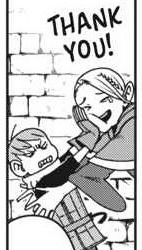
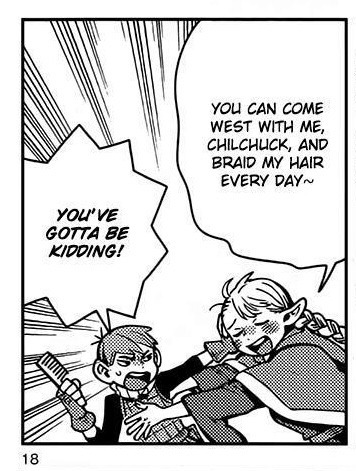

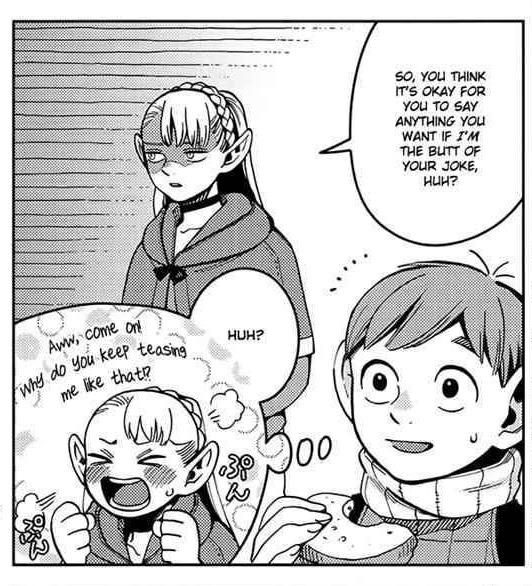
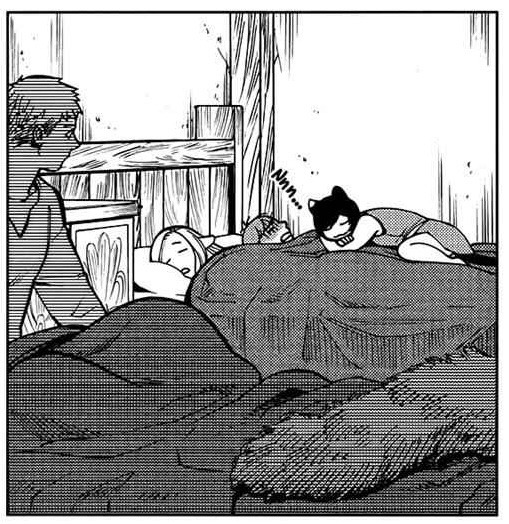
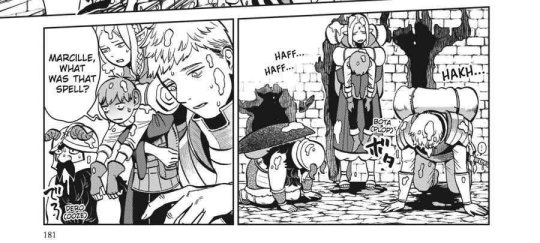
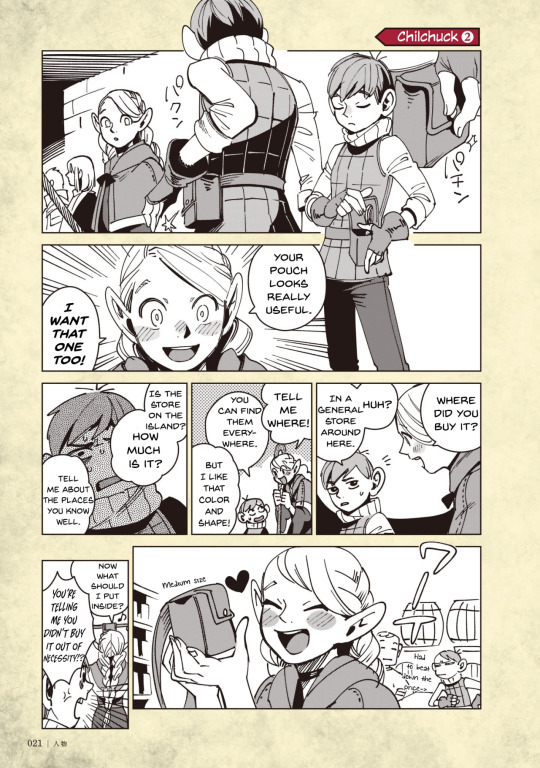
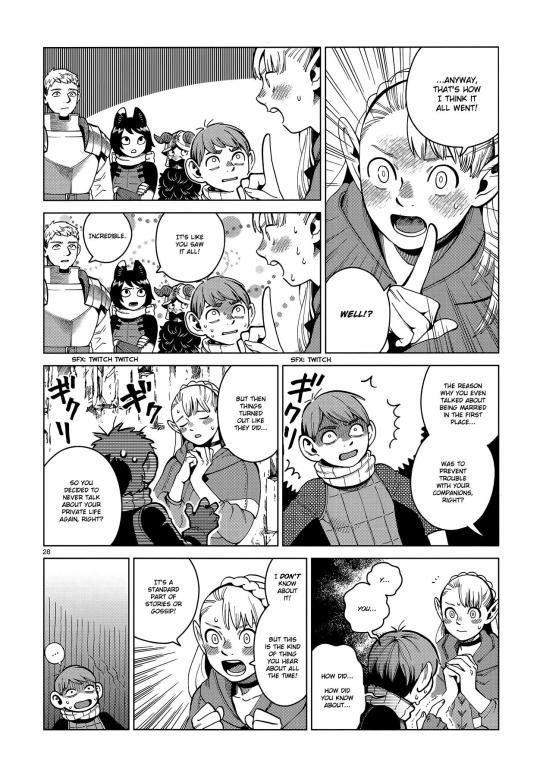
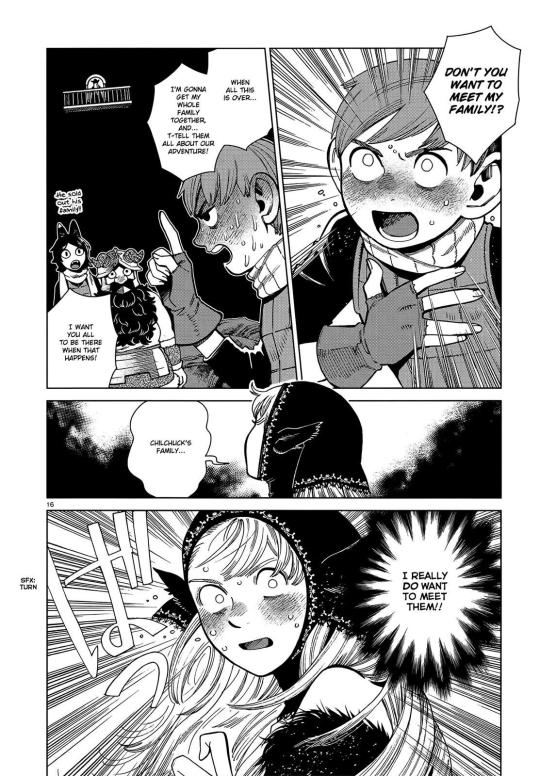
#marchil#ask#dungeon meshi#This thought is silly but in the song Everybody Talks (about everyone gossiping about a couple’s romance hehe) there’s a line that goes#Enough with the chitchat bring me to your love shack#And every time I hear it I’m like… Omg Chilchack Tims sir?!!#Marcille trying to make flirty puns at him be like#Me showing off my ship to people and it’s her proudly showing him a clump of cat hair…#I think about her holding him in her arms like some big plushie so much. Chil ragdolling#You know what else about them I think about a lot? Him shivering in fear at Marcille reading him so well. The mortifying ordeal of being-#-known UGHHHH BANGING MY FISTS ON THE TABLE I LOVE THEM SO MUCH#“I’m going to introduce you to my family” says he while madly blushing to bait the woman with her desires. which WORKS#THE ADVENTURER’S BIBLE COMIC MEANS THAT THEY WENT OUT SHOPPING TOGETHER OUTSIDE OF WORK BTW. SCREAMING#If I start I’m going to slippery slope into talking about the times he risked himself while trying to get her to safety AND THE SUCCUBI AND#OUGHHHHHHHHH#Marcille being a minefield of feelings… Our rogue has it cut out for him#Fumi rambles#Dungeon meshi manga spoilers#Spoilers#If you’re in an especially delulu marchil mood the “i’ll introduce you to my family” scene almost can read as a proposal. I’M SORRY I’M SOR
14 notes
·
View notes
Text
Thinking about going to World Most Boring Bible Study Ever. Idk yall. Idk. Idek.
#the number of times i have faked a call yo leave early. the number of times ive played solitaire on my phone. i got to the potty to kill tim#like! just answer questions its not that hard!!!!!!#you dont even need to be right just throw some spaghetti at the wall and see what sticks!#also group leaders stop reading questions from a script from your phone#ALSO PLEASE CAN WE STOP GOING THROUGH THE SAME VERSES WE GO THROUVH ON SUNDAYS#this is why we have a split in our life group/church crowdm just sayin#i just. i just miss doing bible studys with people who were way smarter than me#being a church kid in a college church is just 👁👄👁#i shpuldnt be dreading going to bible study!!!!!!#so its probably a me problem right?!#and also the group leaders have had to tell me to stfu more than once (politely. which was really annoying. dont pussyfoot around!!)#also our only bible study is also our ~only space for new comers~ so i get in trouble if i get too meaty in my excitements and theology#EHICH SHOJLDNT BE MY FAULT!!!!!!!#and YEAH it IS my fault that its my only spot where im spiritually feeding. but also there is a secret eomens group people mention that..#i guess im just excluded from? but also i know most of the women dont like me bc I have interminable Doesnt Shut Up Disease l#like i understand fhat yes it is a little my fault rhat me talking about deep theology makes them feel inadequate but also THAT SHOULDNT BE#guh. i also forgot my meds today so im a little bit more mulish and hard hearted#and i KNOW its a teachable moment amd God is usimg this to temper me or something else but im feelimg grumblr#and ill probably delete this later.#and i have to got to work ok bye
12 notes
·
View notes
Text
"Scripture is sufficient."
Hm. Yup. No one said it wasn't.
"That's why I don't watch X media based on the Bible."
So, I'm gonna go out on a limb here and say that you also don't sing any hymns in your church's worship service then, huh? Because, ya know, the Bible has an entire book of songs already, so you don't need any others.
But I'd bet money that's not the case at all. Because we use media other than the Bible to supplement our worship all the time. From visual aids in Sunday School classes down to the décor, they are things we add. And it doesn't make any of them inherently wrong.
Look. I don't care if you, personally, don't like something or not. That's not what this is about. What I have a problem with is you tacking on a "holier than thou" sentiment to a subjective opinion. "Scripture is sufficient." Yes. It is. "I don't like this piece of media because it adds bits" (that don't contradict Scripture). Personal Preference.
And you are allowed to have personal preferences. But you don't need to justify them or belittle other believers in order to say, "I'm not a fan."
So all I can say is this: if you're going to toss out visual media because "scripture is sufficient" then you'd better be prepared to throw out your hymnals, too.
#yes this about someones opinion of the chosen#and lemme tell you the chosen is a lot more biblically sound than a lot of hymns#or do people just not pay attention to the words theyre singing?#'old' doesn't inherently been 'better'#thats a different story though lol#point being it just rubbed me the wrong way#especially considering the chosen specifically has message before the first episode that basically amounts to#'GO READ YOUR BIBLE OKAY'#like they have NEVER claimed to be a replacement for scripture#in fact dallas has said the opposite so many times that it hurts#rubs me the wrong way like an old pastor i had growing up that said you shouldn't script prayers because it makes them less sincere#which is utterly terrible advice btw#another tangent wheeeeeeee lol#anyway heres a fun fact to leave you with:#the chosen can actually make it into countries where the bible is banned because the app is labeled simply as 'entertainment'#so it's not blocked#if it's between the chosen and someone never hearing the gospel otherwise?#yeah i think you guess what i think about that#anyway#*steps off soapbox*#I feel better now lol#the chosen#the chosen tv series#christianity
25 notes
·
View notes